Gloving in yeovil
Yeovil Glove Company
of the Nautilus Works, Reckleford
There is very little information available concerning the Yeovil Glove Company. That the company was extant during the Second World War is evidenced by the white leather ski mittens in my collection made by the company for the army in 1942, photographed below. After the war the company placed an advertisement in the Western Gazette's edition of 16 November 1945 seeking "Singer Pique and PXM Machines and Stands wanted" (Pique is where one edge of the leather is lapped over the other and sewn, while PXM was a variation of the outseam, made on a special machine, in which the stitches run horizontally). Certainly by 1945 the company had a second glove factory at Charlton Adam.
The company was a Listed Exhibitor at the 1947 British Industries Fair where they were described as "Manufacturers of Ladies' and Gentlemen's Leather Lined and Unlined Gloves; also Fur and Furback and Novelty Gloves and Real Hogskin Gloves". The company's address was given as Nautilus Works, Reckleford, Yeovil, Somerset. Telephone: Yeovil 484. Cables: "Quicgloves". The fair was held at Olympia and Earls Court, London, from 5 to 16 May, 1947 and the Yeovil Glove Company exhibited at Earls Court, 1st Floor, Stand No. 446a. The event was organised by the Export Promotion Department of the Board of Trade.
|
The following is taken from notes of a speech given by RF Sibley in the 1950s, concerning his grandfather who worked at the Yeovil Glove Company. Many thanks to Jon Sibley for permission to reproduce it here.
He came to Yeovil and worked for the Yeovil Glove Company, rising to a foreman leather dresser in Kiddles Lane (Eastland Road). In those days leather dressing was not mechanized at all. Skins were dressed in open tubs about ten feet in diameter by three feet deep, and the men trod them wearing ‘shorts’. I remember the many colours of the dyes on their legs. They used, in those days, many peculiar substances to dress the skins including dogs manure (from the kennels), barrels of which were inclined to explode and you can imagine the smell. I remember a man after dipping it out, just wiping his hands on a piece of sacking and eating his elevenses. They also used red arsenic, a most dangerous substance, and although they killed the rats with it, I never heard of a fatality with it. They also used egg-yolk from fresh farm eggs and grandfather used to bring the whites home to feed his family of eight children. The method of removing the hair or wool was to allow the skins to reach a certain stage of putrefaction (again you can imagine the stench) when the wool would come off quite easily. On a humid Sunday it was not unusual to call the men to leave church, otherwise the skins would disintegrate.
|
The Yeovil Glove Company Limited went into liquidation in 1965 and has since become a leading UK insolvency law case (United Kingdom insolvency law regulates companies in the United Kingdom which are unable to repay their debts).
The case concerned voidable floating charges for past value. Holding that a floating charge can harden when it secures a debt in an overdraft account, when the bank keeps the facility open as a company takes money out and puts money in. The liquidator of Yeovil Glove Company Limited sued National Provincial Bank Ltd to rescind a floating charge taken within 12 months before insolvency. The bank's floating charge was to secure Yeovil Glove's overdraft, which (on top of debts of £94,000 to other unsecured creditors) had grown to £67,000 when the bank took fixed security and then as money was still unpaid, a floating charge. Over the next year, Yeovil Glove paid £111,000 and drew out (through cheques written to other people that the bank was honouring) £110,000. At the time the Insolvency Act 1986 section 245 (formerly Companies Act 1948 section 322) read that a floating charge was voidable ‘except to the amount of any cash paid to the company at the time of or subsequently to the creation of, and in consideration for, the charge.’ The bank contended that because more money had been paid out of the account than was covered by the charge (albeit that new debts were run up) the charge was not voidable. As in Clayton's case, money going into an account is presumed to discharge the last debt first. So money had been advanced to the company to a greater extent than the charge, and the turnover of money converted the old value given into new value.
No, sadly, I
didn't follow
much of that
either.
gallery
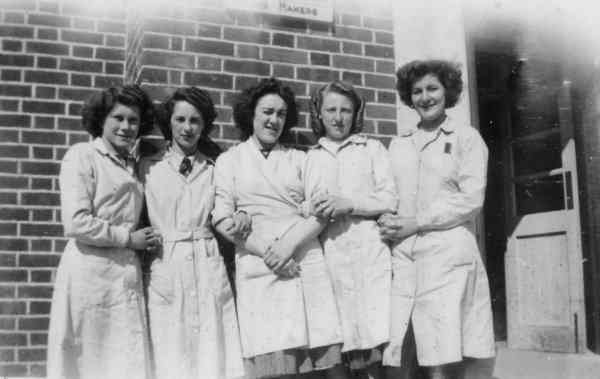
Courtesy of
Maxine Hawker
Girls of Yeovil Glove Company's staff pose for a photograph in the late 1940s. From right to left, the girls are - Barbara Griffin, Barbara Barry, Betty Bastin, Beryl Griffin and Stella Strode.
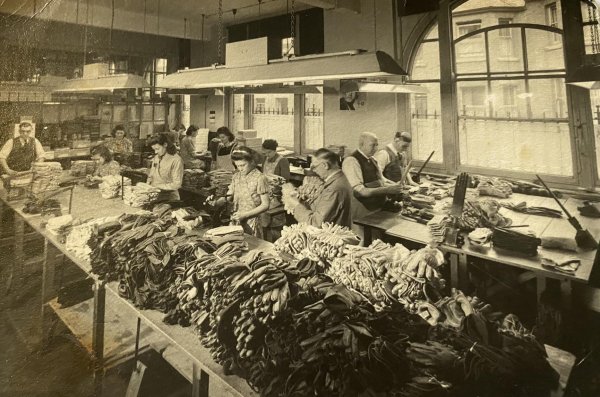
Courtesy of
Jackie Crate
The Yeovil Glove Company, photographed in the Nautilus Works during the late 1940s or early 1950s. The girl on the right is Jackie's mum, Barbara Rendell, née Griffin (also seen in the previous photograph).
Note the houses of Salisbury Terrace, on the other side of Reckleford, seen through the window.
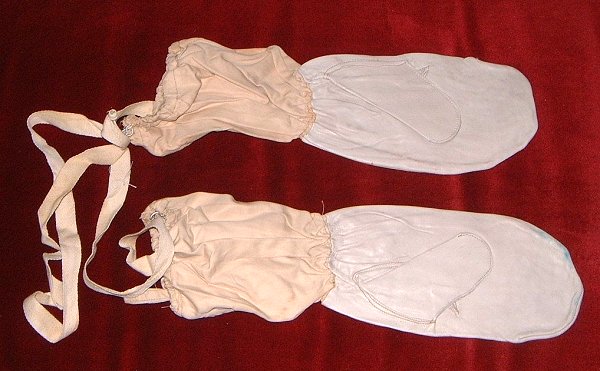
From my
collection
Leather ski mittens produced for the army in 1942. White leather mittens with cotton cuff and adjustable elasticated draw string in the wrist with a white cotton webbing strap between the mittens to prevent loss when they are taken off, the strap passes inside through the sleeves of a coat when worn. As worn by ski troops, commandos etc., Dated 1942 Yeovil Glove Company Ltd.
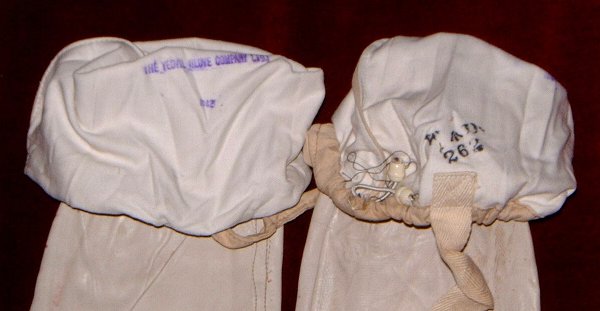
From my
collection
Stamps inside the gloves are of the Yeovil Glove Company at left and the War Department's 'WD' and broad arrow at right.
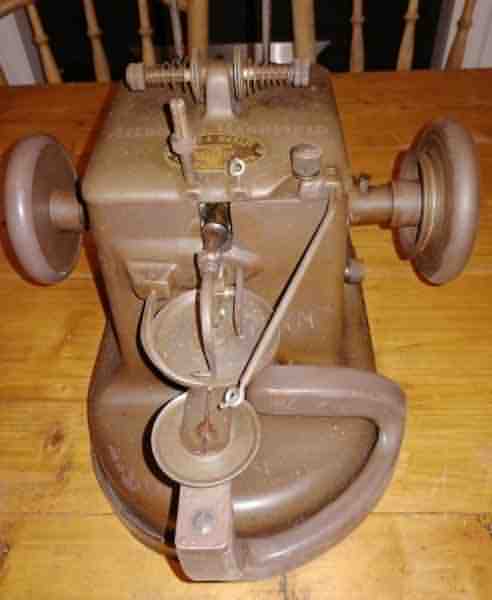
A 'Success' glove sewing machine, made by Allbrook & Hashfield of London around 1930 and retailed by Hyde and Wakely of Yeovil. This example came from the Yeovil Glove Company of the Nautilus Works, Reckleford.
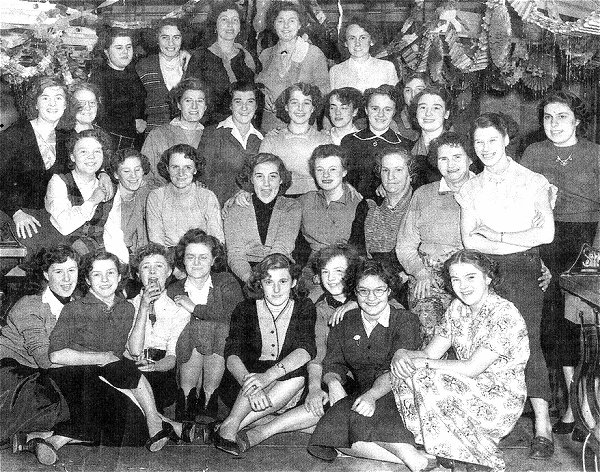
Workers of the Yeovil Glove Company during the 1950s in a photograph published in the Western Gazette.
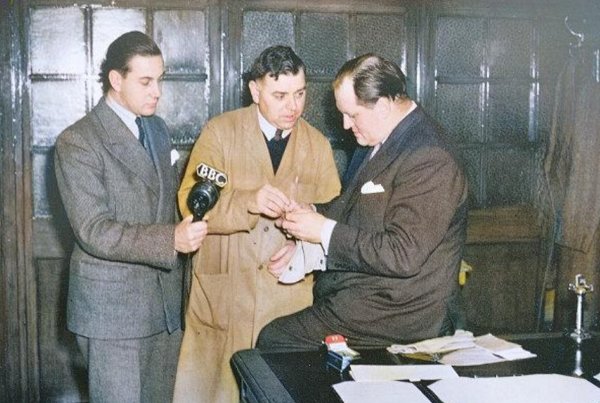
Courtesy of Jack
Sweet
Around 1953 the BBC visited the Yeovil Glove Company to record a programme of "Down Your Way" for the BBC Home Service. This colourised photograph shows Mr Hillard of the Yeovil Glove Company explaining the glove making process and products to the BBC's interviewer and programme host, Richard Dimbleby.